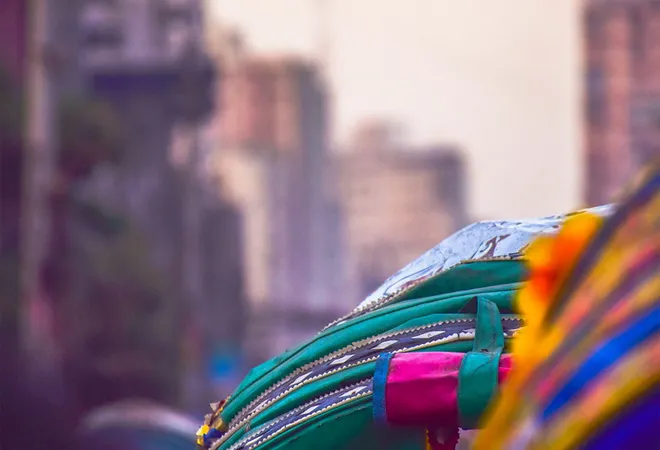 This article is part of the series — India–Bangladesh Relations @50: Commemorating Bilateral Ties.
This article is part of the series — India–Bangladesh Relations @50: Commemorating Bilateral Ties.
The year 2021 marks the golden jubilee of the Bangladesh Liberation War. It also marks 50 years since the establishment of bilateral diplomatic ties between India and one of India’s closest neighbours, Bangladesh. When the inhabitants of the then East Pakistan (now Bangladesh) were fighting the Pakistan Army for their liberation and for their new dream nation, India was on their side. India’s support for Bangladesh’s liberation struggle was not only at the formal level, but also at the people-to-people level. Therefore, when the flight of millions of people to India escaping the genocide in East Pakistan started, it reminded the inhabitants of India (in general) and West Bengal, Assam, and Tripura (in particular) of the days of Partition of the Indian subcontinent in 1947. The host communities in India in these three bordering states once again did not hesitate to accommodate the refugees from East Pakistan, and also extended their wholehearted support for the autonomy of the Bengalis in Pakistan.
On the one hand, the clarion call of Bangabandhu Sheikh Mujibur Rahman for the liberation of Bangladesh in March 1971; and on the other hand, the onslaught of a cyclone of unprecedented intensity on five districts and a number of offshore islands of East Pakistan on 12 November 1970 — considered to be the deadliest in recent history, causing enormous loss of life and damage of property — radically changed the template of regional politics as well as that within East Pakistan. While at least 10 million people from East Pakistan sought refuge in India, an official estimate of the death toll on account of the cyclone was at least between
300,000 and 5,00,000. These human catastrophes generated a critical mass for the liberation of Bangladesh, which in these intervening decades has turned into an important economy of South Asia and a major ally of India in her immediate neighbourhood.
When the flight of millions of people to India escaping the genocide in East Pakistan started, it reminded the inhabitants of India (in general) and West Bengal, Assam, and Tripura (in particular) of the days of Partition of the Indian subcontinent in 1947.
India was one of the first countries, along with Bhutan, to recognise
Bangladesh as a sovereign state on 6 December 1971. It is also worth recalling that India shares its longest border of 4,096.7 kilometres with Bangladesh, which is also the fifth longest border in the contemporary world. Moreover, India and Bangladesh have very close socio-cultural, linguistic, and economic linkages that are the outcomes of a common historical legacy and geographical proximity. In spite of these commonalities, India-Bangladesh bilateral relations have experienced many ups and downs over the last 50 years, wading through the ebb and flow of the politics in the eastern part of South Asia. The assassination of Bangabandhu Sheikh Mujibur Rahman, the Father of the Nation of Bangladesh, in 1975, was not only a severe blow to Dhaka but also to New Delhi. The new nation of Bangladesh, eager to enjoy the newfound autonomy after its liberation, instead had to witness a different kind of political system in the following years that was more reminiscent of the Pakistan-era military rule. The military rule in Bangladesh for the next one-and-a-half decade also had a dampening effect on India–Bangladesh relations. The restoration of democracy in Bangladesh at the turn of the 1990s and the subsequent maturation of her democracy and development of Bangladesh’s economy have gradually heralded a new epoch in the relations between Dhaka and New Delhi. Despite quite a number of misunderstandings between the two neighbours, their bilateral relations have reached a new height through several agreements and mutual understandings. The Land Boundary Agreement (LBA) is one classic example, which was a major milestone in developing bilateral cooperation and ensuring regional security.
The assassination of Bangabandhu Sheikh Mujibur Rahman, the Father of the Nation of Bangladesh, in 1975, was not only a severe blow to Dhaka but also to New Delhi.
Bangladesh is not just another neighbour of India; Bangladesh will always remain unique for a number of reasons for India. It is more than the histories of the partition of the Indian subcontinent; the geography will continue to dictate the destinies of India and Bangladesh as these two neighbours have to remain inseparably intertwined. A similar feeling will also exist among the people of India’s Northeast as this ‘Bangladesh-locked’ region can have an entirely different future through the gateway of Bangladesh. In other words, from the perspective of India’s Northeast, Bangladesh is India’s most strategic neighbour, whom New Delhi cannot ever afford to ignore. India’s dream of ‘Act East Policy’ can only be materialised with the helping hands of Dhaka. The first 50 years have consolidated the foundation of India-Bangladesh relations. The future will present itself with an abundance of opportunities to help the two countries to reach a new plane of bilateral relations higher than ever before, provided that the leadership of the two neighbours play their diplomatic cards with more maturity and pragmatism, keeping the regional aspirations and nuances of both the countries in mind. A judicious aggregation of regional expectations on both sides of the border will help in achieving their mutual national objectives.
The views expressed above belong to the author(s). ORF research and analyses now available on Telegram! Click here to access our curated content — blogs, longforms and interviews.



 This article is part of the series —
This article is part of the series —  PREV
PREV


